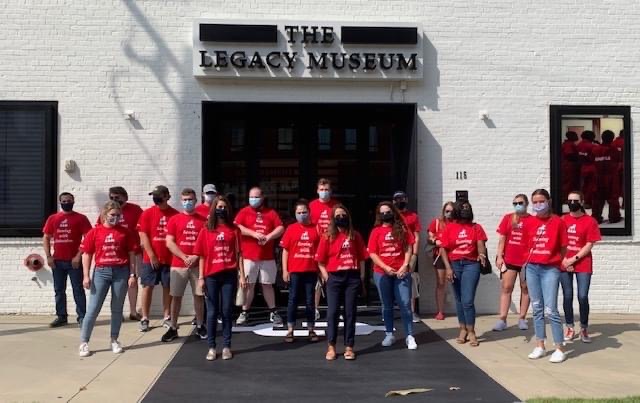
Samford University’s Cumberland School of Law welcomed new students for its Juris Doctor program during their first-year orientation Aug. 10-12, 2020.
The class of 2023 is already making history at Cumberland. A record 57% of the class is female, and the group of 150 students maintains Cumberland’s commitment to strong credentials and community service. According to Assistant Dean for Admission and Enrollment Management Whitney Dachelet, the number of applications for this incoming class exceeded expectations during the pandemic – Cumberland applications were down only 5% from 2019 but were higher than 2018.
“It was such a pleasure getting to know our students individually throughout the year and observing their commitment to pursuing their legal education despite the obstacles of the pandemic,” said Dachelet. “Our admission process remained competitive, and we are pleased that the class of 2023 brought an increased level of academic achievement in undergraduate grade point averages. I am inspired by the resolve and grit this class has exhibited. Our new class is gracious, kind, passionate and determined—the definition of a Cumberland lawyer. We are eager to see all that they will achieve.”
Cumberland’s first-year students represent 12 states, four countries, 48 undergraduate colleges and universities, and a wide variety of undergraduate majors. They bring with them a variety of experiences, including playing collegiate sports, earning master’s degrees, serving in the military, living abroad and spending numerous hours volunteering in their communities.
At orientation, students heard from 1997 alumna Elisabeth French. French serves as the presiding judge for the 10th Judicial Circuit of Alabama, the largest circuit with the highest volume of litigation in the state. She is the first woman to ever be selected for this role. Her address to the first-year students focused on exhibiting perseverance and hard work over the next three years.
Orientation was held in Samford’s Wright Center this year because of social distancing requirements and also included a virtual component to limit in-person contact. Regardless of the distancing measures taken, the three-day event offered activities to ensure each student’s success, including sessions topics such as “1000 Days to the Bar,” “The Habits of Highly Effective Law Students,” implicit bias training, and introductions to Cumberland’s career development, externship, and public interest programs.
On the third and final day, the first-year class had the opportunity to participate in a truly memorable activity. As a part of the Equal Justice Initiative’s (EJI) Law School Racial Justice program, the students made a trip to Montgomery, Alabama, to visit The Legacy Museum: From Enslavement to Mass Incarceration. The museum, dedicated to educating the public about the history of racial inequality, is built on a site where enslaved people were once warehoused and is steps away from an Alabama dock and rail station where tens of thousands of Black people were trafficked during the 19th century. The museum houses the nation's most comprehensive collection of data on lynching and is considered “an unparalleled resource for researchers.” It also presents previously unseen archival information about the domestic slave trade brought to life through new technology.
The visit allowed Cumberland’s new law students to engage with sites that detail the history of racial injustice and equipped them with the necessary context to reflect on how it is relevant today.
District Court Judge Martha Cook, a 1996 Cumberland alumna, joined the group at the Legacy Museum. “I’m proud of Cumberland for taking the lead and taking these students places that other students may not be going and letting them learn something early in their law school career about true justice in America,” she said.
As the group wrapped up their visit to the sites, they were gifted with two New York Times best-selling books, Just Mercy: A Story of Justice and Redemption by EJI founder and widely-acclaimed public interest attorney Bryan Stevenson, and The Sun Does Shine: How I Found Life and Freedom on Death Row by former death row inmate Anthony Ray Hinton.
Cassandra Adams, assistant dean and director of Cumberland’s public interest program, said, “It is my hope that the EJI experience will fortify the first-year law students’ commitment to building a better community—for everyone. The hashtag used during the day, #changemakers2b, represents the bounty of intellect, talent, experience, creativity and fortitude found in the class of 2023.”
